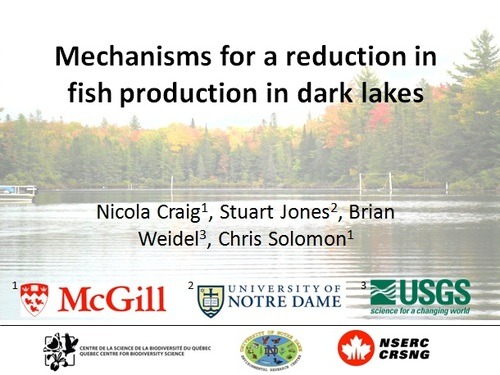by Nicola Graig
Thanks to the QCBS excellence awards, I was able to attend the Joint Aquatic Sciences Meeting in Portland, Oregon this past May. This was a particularly exciting meeting as it was the combination of four leading aquatic research societies including the Society for Freshwater Science and the Association for the Sciences of Limnology and Oceanography. The large scale of the meeting made it a great opportunity to catch up with colleagues and collaborators as well as network with aquatic ecology experts from around the country. There was a large variety of subject matters discussed and I made a particular effort to attend some sessions outside of my normal ‘research range’ and as a result, learnt some potential new techniques I could use to improve my own work!
I gave a presentation on Thursday afternoon discussing different mechanisms that can affect fish production over a water color gradient. Essentially, research has shown that fish production tends to decline in darkly stained lakes compared to those with clear water. However, the mechanisms that result in this reduction in productivity are not well understood. My research is showing that a combination of a reduction in resource as well as habitat availability in darker lakes may lead to reductions in fish growth rate, maximum size, age at maturity and average reproductive output. We can use this knowledge to better understand how lake ecosystems work and to better manage dark-water systems which are common in northern temperate and boreal regions. The ecosystem-level effects of terrestrial inputs into lakes which can stain waters is a pretty hot-topic in limnology at the moment so I had a lot of interest in my presentation which was exciting! I also received some thought-provoking questions which improved my research model.

Portland was a really vibrant city and we were lucky enough to have beautiful weather for the whole week. One of the highlights for me was a large social gathering for the conference participants in the Pioneer Courthouse Square downtown. It was surreal to see so many aquatic scientists merry-making in the same place at the same time and the setting made it easy to meet new people as well as catch up with old friends! Attending this meeting really helped me to improve my research methods, consider new ideas and make some new contacts to bounce ideas off in the future, so thanks for the opportunity QCBS!

0 Comments